County Board Updated on Public Transit Plans
Washtenaw County board of commissioners working session (March 22, 2012): Commissioners got another briefing about transitioning to a countywide public transportation system, but several expressed concerns about some aspects of the proposal.
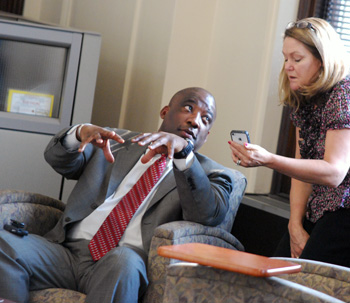
Michael Ford, CEO of the Ann Arbor Transportation Authority, talks with AATA community relations manager Mary Stasiak before the start of the March 22, 2012 Washtenaw County board of commissioners working session. Ford gave an update on plans for a countywide transit agreement. (Photos by the writer.)
Michael Ford, CEO of the Ann Arbor Transportation Authority, gave the presentation and fielded questions during the county board’s most recent working session. He touched on some of the same ground that he’d covered at the board’s Dec. 7, 2011 meeting, but provided updates on several actions that have taken place since then. Most significantly, the Ann Arbor city council has approved a four-party agreement that the county will also be asked to join. The agreement does not create a new transit authority, but sets out the process and framework – including a timeline – by which a new authority would be formed.
Ford stressed that the county would not be required to fund the new authority or put a millage on the ballot. Nor would it incur liabilities for the entity. “Your role is important, but it’s limited,” he said. The county’s primary role would be to file articles of incorporation with the state to form the authority under Act 196 of 1986.
Some commissioners expressed unease with aspects of the process, and pressed Ford for details on several issues. Dan Smith was concerned about how residents in smaller townships would be represented fairly, noting that the residents themselves won’t be voting on whether to participate – that decision will be made by the governing bodies of each municipality. Wes Prater said his main objection is that the process requires municipalities to opt out, rather than opt in – he characterized it as throwing out a wide net and making people crawl out, rather than choosing to join. He predicted that at least 12 townships won’t participate.
Both Smith and Prater represent primarily rural districts. Yousef Rabhi, a commissioner from Ann Arbor, urged the board to take a more regional perspective, arguing that an insular approach among municipalities has plagued this county for a long time, and they need to move past that.
The March 22 working session also included a briefing on state legislative issues by Kirk Profit, a lobbyist for the county with Lansing-based Governmental Consultant Services Inc. This report focuses on the countywide transit presentation.
Countywide Transit
An effort to create a countywide transit system has been underway for about two years, led by the Ann Arbor Transportation Authority. The new transit governance structure would be provided under Act 196 of 1986 instead of the state statute under which the AATA is currently incorporated, which is Act 55 of 1963. Act 55 was originally conceived to provide public transportation for cities, while the subsequent Act 196 was enacted to allow a broader range of political subdivisions to create public transportation systems, including counties. [See "Act 55 versus Act 1986" for more detail.]
To set a formal framework to move ahead in this transition, a four-party agreement is being negotiated with the cities of Ann Arbor and Ypsilanti, Washtenaw County and the AATA. It would not create a new authority, but would stipulate a set of of required actions and a timeframe for setting it up. The Ann Arbor city council was the first entity to approve the agreement, which it finally did at a March 5 meeting after considerable debate at multiple meetings, and several amendments along the way. [.pdf of current draft four-party agreement]
Called for in the four-party agreement is a 15-member board, to which Ann Arbor would appoint seven members. The AATA currently has a seven-member board.
Several steps remain before the AATA’s operations could transition to a new governance structure, including: (1) the approval of the four-party agreement by the city council of Ypsilanti and the Washtenaw County board of commissioners, as well as the AATA board; (2) ratification of articles of incorporation by the city councils of Ann Arbor and Ypsilanti; and (3) voter approval of a funding mechanism for the new transit authority.
For additional background, see Chronicle coverage: “Ann Arbor Takes Late Bus to Transit Accord.” The AATA has also set up a website with information about the countywide transit proposal.
Countywide Transit: Presentation
Michael Ford, CEO of the Ann Arbor Transportation Authority, has previously given updates to the county board, most recently at their Dec. 7, 2011 meeting. At the March 22 working session, he was joined by board chair Jesse Bernstein, as well as staff members Sarah Pressprich Gryniewicz, AATA’s community outreach coordinator; Mary Stasiak, community relations manager; and strategic planner Michael Benham.
Ford began by describing what had happened since his December update, saying that it’s been a busy few months. AATA has launched more frequent service on the bus route between Ypsilanti and Ann Arbor, he said, with buses coming through every 5-10 minutes during peak periods. Ridership has increased on that route as a result, he said. The board also approved a new bus service to Detroit Metro Airport, Ford noted, which began April 2. And a new vanpool service will begin in late April.
A community survey was completed that showed strong voter support for public transit, Ford told commissioners. [.pdf of survey's executive summary. Also see Chronicle coverage of a report of the survey given at AATA's Feb. 16 meeting.]
Then in late February, a financial advisory group issued initial recommendations regarding possible funding mechanisms for countywide transit. [.pdf of financial group's final report] [.pdf of financial group's subcommittee report]
Ford read aloud a portion of a letter from the group’s co-chair, McKinley CEO Albert Berriz: “We started with a funding gap of $63 million and reduced that to $32 million. What remain are the solid components of the plan, a more pragmatic view on charging higher user fees for certain services, and no soft dollars in the plan for R&D. So regardless of how the community chooses to fund this gap, and whether or not it elects to do so, the amount on the table has been rigorously reviewed and it stands on its own two feet.” [.pdf of Berriz's letter] Ford thanked the task force members for their work.
Finally, Ford reported that the Ann Arbor city council had approved a four-party agreement at its March 5 meeting. The Ypsilanti city council is expected to vote on the agreement within the next couple of months, and then Ford said he plans to return to the county board to seek their approval as well. The county will ultimately be asked to file articles of incorporation with the state that would create the new Act 196 transit authority.
Ford said that he and his staff are refining a five-year transit plan, which will help municipalities determine if they want to participate. For urban areas, he said the proposed improvements will include increased frequency of services – at intervals of 10, 20 and 30 minutes for key corridors – as well as earlier and later service on weekdays. Extended hours on weekends are also planned, and current one-way loop routes will be changed to two-way routes.
For rural areas, proposed service improvements include vanpools, commuter express services, community circulator buses, and door-to-door service for seniors and people with disabilities.
Ford told commissioners that 22 of the county’s 27 municipalities are participating so far in an unincorporated Act 196 (U196) board. Representation on the 11-member U196 board covers 95% of the county’s population and 75% of its geographical area, he said.
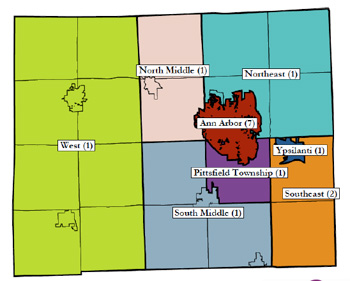
Possible composition of board membership for a Washtenaw countywide transit authority. (Links to larger image.)
Membership in the U196 board includes three members of the AATA board (Jesse Bernstein, Charles Griffith and David Nacht), as well as these representatives from seven designated districts: Pittsfield District – Mandy Grewal (supervisor, Pittsfield Township); Northeast District – David Phillips (clerk, Superior Township); North Middle District – David Read (trustee, Scio Township) with alternate Jim Carson (councilmember, Village of Dexter); Southeast District – (1) Karen Lovejoy Roe (clerk, Ypsilanti Township) and (2) John McGehee (director of human resources, Lincoln Consolidated Schools); West District – Bob Mester (trustee, Lyndon Township) with alternate Ann Feeney (councilmember, city of Chelsea); Ypsilanti District – Paul Schreiber (mayor of Ypsilanti) with alternate: Peter Murdock (councilmember, city of Ypsilanti); and South Middle District – Bill Lavery (resident, York Township).
The four-party agreement defines a transparent process, Ford said. The county’s only role would be to file the articles of incorporation for an Act 196 authority, he said. Act 55 authority, under which AATA is incorporated, wasn’t written to easily accommodate relationships among multiple governments, Ford said. That’s why the Act 196 process is needed.
A four-party agreement does not create a countywide authority, Ford explained. Nor does it obligate communities to participate in a countywide authority. The agreement also doesn’t jeopardize existing transit services, he said.
What the agreement does is to define a process that allows a plan for countywide transit services to be developed, Ford said. It sets clear expectations and roles for the different entities, he said, as well as limitations and timeframes for the process. The decision to pursue a countywide system ultimately will be up to taxpayers, he said.
Ford stressed that nothing will move forward until (1) the public has commented on a five-year transit plan, (2) the U196 board requests to incorporate as an Act 196 authority, and (3) each community in the county decides whether to participate. After all of that happens, an Act 196 authority could be formed, but it would initially have no assets. AATA’s services and assets would remain in the current Act 55 authority.
A new Act 196 authority would begin operations only if taxpayers approve additional funding and all conditions of the four-party agreement are met, Ford said.
He also elaborated on the roles and responsibilities laid out in the four-party agreement. Later this year, the U196 board will complete a five-year transit plan, then ask that the county file the articles of incorporation with the state for an Act 196 authority. The new authority’s boundaries would encompass Washtenaw County, but any municipality could opt out of participation. As required by law, certified letters would be sent to each municipality, and the governing bodies of each entity would decide whether or not to participate. Communities that opt out of the authority would not be taxed and would not receive transit service.
The county could appoint a liaison to attend the new authority’s meetings, but the county government would not take on any liabilities of the authority, nor risk the county’s full faith and credit, or be asked to put any funding request on the ballot for voters.
If funding for a countywide transit system if established, that’s when the cities of Ann Arbor and Ypsilanti would transfer their millages to the new authority. AATA would also transfer its assets, operations and obligations to the new authority.
Ford concluded by telling commissioners that “your role is important, but it’s limited.” It helps establish a rational, transparent process, he said.
Ford then asked if commissioners had any questions. They did.
Countywide Transit: Board Discussion
Questions and comments from commissioners covered a range of topics. For this report, the discussion is organized thematically.
Countywide Transit: Board Discussion – Township Voter Rights
Noting that Salem Township is not participating at this point, Dan Smith asked what the process would be if the township wanted to join the Act 196 authority after it was incorporated and after voters had approved a half-mill tax? [The financial advisory group indicated that if it's decided that a tax should be the funding mechanism for a countywide transit system, then the amount of tax needed to provide sufficient revenues would be an 0.5 mill. One mill is equal to $1 for every $1,000 of taxable value of a piece of property.]
Act 196 has provisions to allow municipalities to join, Ford said. When Smith asked what specific mechanism would be used, Ford said there are a lot of potential scenarios. Options are being discussed, Ford said, and there will be flexibility.
Smith clarified with Ford that currently, only Ann Arbor and Ypsilanti levy transportation millages. He wondered when voters in Northfield Township would be able to weigh in on a millage. When Ford pointed out that Northfield was at the table of the unincorporated 196 group, Smith asked again when taxpayers would weigh in on a millage. Ford replied that after funding and a service plan had solidified, more information would be available.
Jesse Bernstein, chair of the AATA board, stepped forward to respond as well. After the articles of incorporation are filed, he said, then entities can decide whether to participate. When those entities decide to be part of the Act 196 authority, then voters in those jurisdictions would get the chance to vote on a millage, assuming a millage is put on the ballot.
In that case, Smith said, the voters wouldn’t be weighing in on whether to participate. And Northfield’s 6,200 registered voters would really have no effective voice because they would be overshadowed by the much larger number of voters in Ann Arbor, he said. It’s the township board that would decide whether to participate, not the voters directly. He said it would be a different situation if Northfield voters could have the chance to decide whether to tax themselves.
Bernstein replied that Smith’s analysis was correct, but he said he didn’t really know how to respond. Presumably the elected officials in the township have gotten feedback from voters regarding whether to participate. It’s the same with every other township, Bernstein said.
Smith said there’s a difference between entities like the townships, which have been around for 100 years or so, and the creation of a completely new transit authority. This new unit of government is a taxing authority in which smaller municipalities are completely overshadowed a large municipality (Ann Arbor), so voters of the smaller entities have very little say. Smith said he just wanted to ensure that voters have a voice. In the case of the proposed transit authority, voters would essentially have no say, he argued.
Bernstein pointed out that it would be a regional approach, more like what’s done at the county level. Smith replied that the county has been around since 1826, which prompted Bernstein to say that things are very different now, and different structures need to be explored. If the Act 196 approach isn’t supported, then AATA will continue to do what it can as an Act 55 authority, Bernstein said.
Smith stated that he’s very concerned about voters in smaller municipalities having a say in this.
Countywide Transit: Board Discussion – Opt-Out Process
Smith then asked about the details of sending certified letters to municipalities as part of the opt-in/opt-out process. Who exactly would be receiving those letters? When Ford didn’t give the kind of specific answer that Smith was looking for, Smith asked whether the letter to Northfield Township would be sent to the Northfield Township Hall, for example. If that’s the case, he said, then the letter becomes the property of the township clerk, and township board members wouldn’t necessarily receive it. Smith suggested sending such letters directly to the home addresses of each township board member.
Felecia Brabec asked about the 30-day window during which municipalities would need to opt out. Entities that have already indicated a desire to opt out would need to respond again, she noted. It’s all about informed consent, she said. If entities believe they’ve already opted out and don’t do anything, would they end up being part of the authority?
Ford said that there would be clear communication – all entities would be re-engaged, he said.
Wes Prater observed that five townships have opted out of the Act 7 process. Why would they have to opt out again “if and when the county does this?” he asked. [Municipalities have been forming districts under Act 7 of 1967 in order to formally participate in the unincorporated Act 196 board. Not participating are the townships of Bridgewater, Salem, Saline, Sharon and Sylvan.]
Ford replied that the Act 196 process is an official one, designed to ensure that everyone has the opportunity to participate. “That’s a very lame answer,” Prater said, adding that he felt it was unfair to those townships. It looks like organizers of the countywide plan are trying to throw out a big net and hope that people don’t try to crawl out of it within the 30-day period. Prater predicted that at least 12 townships will eventually opt out of the Act 196 authority.
Ford said the point is to inform the public – it can’t hurt to communicate. But that’s not what’s happening, Prater argued. Townships have sent letters indicating their preference. Ford replied that in some cases, the decision to opt out has been given verbally, while in other cases township boards have passed formal resolutions.
Prater said he wasn’t opposed to the plan. He only had one area of disagreement – he believed municipalities should be able to opt in, rather than forcing them to opt out. He indicated reluctance to support the project as it’s currently proposed.
Rolland Sizemore Jr. stated that he didn’t believe 30 days is long enough for township boards to vote on whether to opt in or out. Most meet only twice a month, he noted. Bernstein replied, saying that’s why the process needs to be open and transparent. The hope is that townships know months in advance, he said, so that when a formal letter arrives, the township boards will already have discussed their decision and be ready to act. Bernstein pointed out that the 30-day period isn’t something that’s arbitrary – it’s a legal requirement in the process of forming the Act 196 authority.
Sizemore said he agreed with Dan Smith – some township elected officials don’t get along, so letters should be sent to individuals at their homes.
Yousef Rabhi asked who would be responsible for sending out formal letters to the local municipalities, after the county board approves the articles of incorporation – would it be AATA, or the county clerk? Ford wasn’t sure and said he’d check on that.
Rabhi said he felt the process of opting out was clear – both initially, and in the future. People’s hands aren’t being tied, he said.
Rabhi then said it’s important to note that a hallmark of democracy is that each person’s vote counts. He objected to separating out the votes of people living in townships against the votes of Ann Arbor residents. They should think of it in a regional context, he said, not as one municipality versus another – that’s what has plagued this area in the past. People need to start moving past that mentality, Rabhi said. No one is going to be taxed without representation, and everyone has a say in this project, he added. If voters decide not to fund it, then the authority can’t exist.
Leah Gunn observed that this process has been a “long, hard trail.” She said it’s not up to the county board to decide what other local governments want to do – and it’s not something that commissioners can predict. The board’s role is just to approve the articles of incorporation, she said. Then the AATA can go out and talk to the township boards. Alluding to Dan Smith’s earlier comments, Gunn said that if the township boards don’t represent the voters in the township, “then there’s trouble.” It’s a representative government, she added, and people can be voted out of office.
Countywide Transit: Board Discussion – Services
Prater then asked what extra services would be provided to out-county townships. That’s still being worked out, Ford replied. In general, offerings like door-to-door service and vanpools might be options, but the AATA is working with representatives from the townships to determine those details, Ford said.
Prater said it was amazing to him that this project has been in the works for two years and these details still haven’t been decided. Townships are being asked to make decisions when they don’t know what they’ll be getting, he said.
Ford noted that a long-term 30-year service plan has been developed and a 5-year plan is in the works, but the governance and funding options need to come together at the same time. The townships are involved, he said.
Would fixed-route service be an option for the townships? Prater asked. That would need to be examined, Ford said. Can the townships choose what services they’d get? Prater wondered. They’d play a major role in deciding, Ford replied.
Countywide Transit: Board Discussion – Four-Party Agreement
Prater then turned his questioning to the four-party agreement. Had the Ypsilanti city council approved it yet?
No, Ford said, but the council plans to consider it within the next couple of months. Prater speculated that the council wanted to wait until after the May 8 election. [Ypsilanti voters will be asked to weigh in on two major ballot issues – a city income tax and a millage to repay debt on the city's Water Street property.]
Ford indicated that Ypsilanti city council has other things on their agenda and he wanted to be respectful of that. “We’ll come back when they’re ready,” he said.
So there’s no hurry on this proposal, Prater replied. Ford said there’s still work to do, and he wanted to keep the issue in front of everyone. It’s important to work together on this, he said.
Sizemore wondered if other municipalities in a new transit authority would have the same rights as Ann Arbor. He referenced the current version of the four-party agreement, which includes specific references to rights of Ann Arbor. He wanted to make sure the agreements for everyone are equal.
Ford pointed out that legal counsel for each of the entities that would participate in the four-party agreement have reviewed the documents, to protect each party’s interests.
Prater asked why the four-party agreement included language specific to Ann Arbor. Specifically, he cited this section:
8. Contingencies to Closing. The closing of the transfer of assets and assumption of liabilities by the NEW TA [transit authority] is contingent upon all of the following occurring on terms acceptable to all parties:
…
d. In exchange for the mayor’s nomination with council confirmation, of seven directors of New TA’s board, annual submission to Ann Arbor of the AATA’s proposed budget and yearly audit and the New TA’s agreement to apprise Ann Arbor City Council and solicit Council’s advice prior to making major long-term policy actions concerning mass transportation services and at a minimum, the continued level of services provided by its predecessor-in-interest AATA, Ann Arbor agrees
(i) take such necessary actions by its governing body to terminate its operational agreement with AATA effective at closing;
(ii) take such necessary actions by its governing body to authorize the execution and delivery of this Agreement and all documents and instruments contemplated by this Agreement, and the performance by Ann Arbor of the obligations to be performed by it hereunder; and
(iii) designate the New TA, as successor to AATA, as the contracting agency for use of the 2.5 mills tax levy under Section 8.18 of the Ann Arbor City Charter and allocated the tax levy in its entirely to AATA at the 2012 millage rate or as adjusted by State of Michigan statute less a municipal service charge of one percent (1%) of the annual millage at the time of the collection of taxes upon transfer from an Act 55 to an Act 196 authority.
Bernstein replied that he didn’t know why Ann Arbor councilmembers had requested that language. Everyone will get the same information – it’s not the intent to give Ann Arbor special treatment, he said.
Prater said he hoped Bernstein would keep his word about that.
Countywide Transit: Board Discussion – Funding, Governance
Rolland Sizemore Jr. asked if the plans call for seeking a millage in 2014. That hasn’t been determined, Ford replied, but the four-party agreement would sunset in 2014 if there’s been no action on funding.
Sizemore followed up by asking if millage funds could be used on any project. He was concerned that it would be spent for mass transit along Plymouth Road in Ann Arbor, or something similar. [Sizemore represents District 5, which covers parts of Ypsilanti Township and a small southern nub of Superior Township, which does not include Plymouth Road.]
Bernstein fielded this question. One of the county’s major transportation corridors runs from the northeast side of Ann Arbor Township and Ann Arbor, down Plymouth Road through parts of the University of Michigan, through downtown Ann Arbor to State Street and down to Briarwood Mall and Pittsfield Township. That’s one corridor outlined in the 30-year transit master plan, he said. Another major corridor in the plan would run from Ypsilanti through Ann Arbor and west along Jackson Road, he said.
Those are long-term plans, Bernstein said. A 5-year plan will determine how those longer-term goals can be achieved.
Sizemore noted that the new authority’s board would be making decisions. Will that board have the authority to borrow money and bond? he asked. And could money be borrowed before a millage is passed?
Bonding would require a vote of the people, Bernstein replied. And no money could be borrowed because there wouldn’t be any way to pay it back without a funding mechanism in place, he noted. AATA does get funding for capital projects – like the purchase of new buses or infrastructure – from state and federal grants, Bernstein said. Those kind of projects might move forward, but they don’t require a tax or bonding.
Sizemore asked whether the current AATA board would be part of the new authority’s board. Yes, Bernstein said. And going forward, those Ann Arbor board members would continue to be appointed in the same way that they are currently appointed – by a nomination of Ann Arbor’s mayor, followed by confirmation by city council. Other local governing bodies would appoint their own representatives.
Sizemore wondered about the 1% municipality service charge mentioned in the four-party agreement – what was that? Pressprich Gryniewicz indicated it’s a carry-over from the AATA’s existing operating agreement with the city of Ann Arbor, to cover administrative expenses.
He then asked for conformation that if a millage didn’t pass, the county board would dissolve the authority. Ford said there’s a timeline laid out that describes what needs to happen. The agreement would sunset in 2014.
Countywide Transit: Board Discussion – Coda
As his final question, Sizemore asked whether AATA allowed people to bring their pet dogs onto the buses. He joked that he loved his dog more than some of his kids. Ford replied that only service dogs – like guide dogs for the visually impaired – are allowed on the buses.
Prater wrapped up the board’s comments by telling Ford that “we’re getting there.”
Ford thanked commissioners, and said he and other AATA representatives would return to continue the discussion.
The Chronicle could not survive without regular voluntary subscriptions to support our coverage of public bodies like the Washtenaw County board of commissioners and Ann Arbor Transportation Authority. Click this link for details: Subscribe to The Chronicle. And if you’re already supporting us, please encourage your friends, neighbors and colleagues to help support The Chronicle, too!




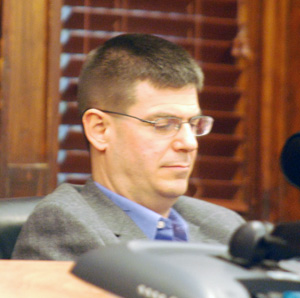
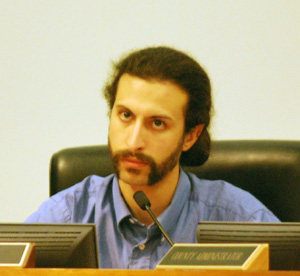
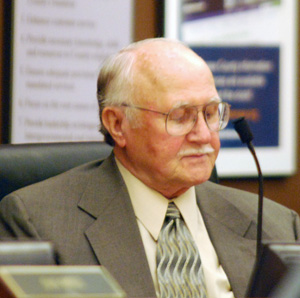
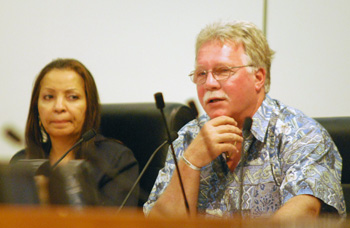
“Sizemore asked whether the current AATA board would be part of the new authority’s board. Yes, Bernstein said.”
This raises a question under the Incompatible Public Offices Act. MCL 15.181 et seq. That act prohibits a public official from serving on two public bodies where the bodies contract with each other. Section 3 of the act expressly exempts some transit authorities, but only if the two authorities include the same communities:
“(11) Section 2 does not prohibit a public officer or public employee of an authority created under the public transportation authority act, 1986 PA 196, MCL 124.451 to 124.479, from serving as a public officer or public employee of another public transportation authority if each public transportation authority has members consisting of identical political subdivisions.”
It appears that the AATA and the new county-wide authority would not consist of “identical political subdivisions.”
I have a slightly different point. As I understand the draft Articles of Incorporation, the Ann Arbor representatives of the 196 board would be appointed by the mayor of Ann Arbor. The mayor could presumably appoint a different set of people, not the current AATA board members. The AATA board does not have the power to appoint itself.
At that time, it might be of interest to raise the question about whether appointees should be residents of the geographical area that they are supposed to be representing. All the other 196 board members are to be appointed from their specific geographical areas. Ann Arbor is not the place of residence of two of the AATA board.